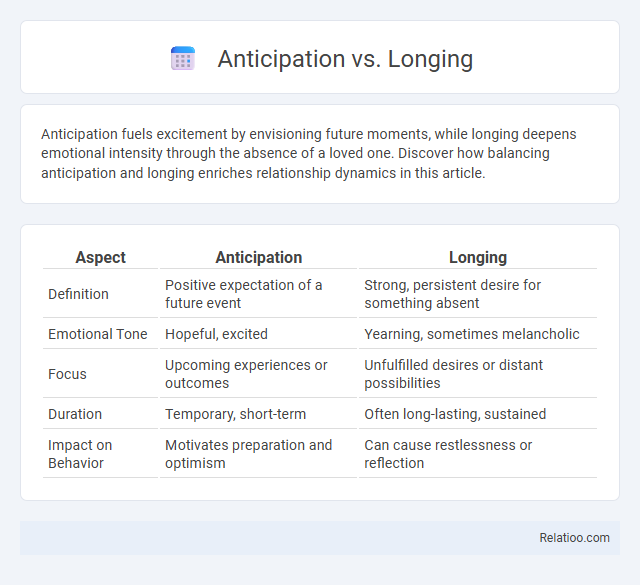Anticipation fuels excitement by envisioning future moments, while longing deepens emotional intensity through the absence of a loved one. Discover how balancing anticipation and longing enriches relationship dynamics in this article.
Table of Comparison
| Aspect | Anticipation | Longing |
|---|---|---|
| Definition | Positive expectation of a future event | Strong, persistent desire for something absent |
| Emotional Tone | Hopeful, excited | Yearning, sometimes melancholic |
| Focus | Upcoming experiences or outcomes | Unfulfilled desires or distant possibilities |
| Duration | Temporary, short-term | Often long-lasting, sustained |
| Impact on Behavior | Motivates preparation and optimism | Can cause restlessness or reflection |
Understanding Anticipation and Longing
Understanding anticipation involves recognizing the eager expectation of a future event, often accompanied by excitement or anxiety, while longing reflects a deep, persistent desire for something absent or unattainable. Your emotional experience shifts from anticipation's forward-looking hope to longing's often nostalgic and wistful yearning. Distinguishing these feelings enhances emotional awareness and helps manage desires and expectations more effectively.
Defining the Emotional Differences
Anticipation is an eager expectation for a future event, characterized by excitement and hopefulness, while longing involves a deep, often painful desire for something currently absent or unattainable. Longing intensifies emotional yearning with a sense of ache or nostalgia, distinct from anticipation's forward-looking optimism. Understanding these emotional nuances helps you recognize how hope, desire, and emotional pain shape your inner experience differently.
Psychological Roots: Where Do They Stem From?
Anticipation stems from the brain's reward system, activating dopamine pathways that prepare you for upcoming positive experiences. Longing arises from unmet emotional or psychological needs, often linked to attachment theory and feelings of desire for connection or fulfillment. Both emotions are deeply rooted in the limbic system, but anticipation is future-oriented excitement, while longing reflects a persistent yearning tied to past experiences or absence.
Anticipation in Everyday Life
Anticipation shapes your everyday life by creating positive expectations that motivate actions and enhance emotional resilience. Unlike longing, which often centers on desire and absence, anticipation involves mentally preparing for upcoming events, boosting focus and happiness. This proactive mindset helps you manage stress and improves overall well-being by aligning present efforts with future rewards.
The Impact of Longing on Our Wellbeing
Longing significantly affects our wellbeing by triggering emotional responses linked to desire and absence, which can intensify feelings of melancholy or motivation depending on context. Neuroscientific studies reveal that longing activates brain areas responsible for emotional regulation and reward processing, influencing mood and behavior. Prolonged longing without fulfillment may lead to stress and decreased mental health, while moderate longing can enhance resilience and personal growth through hopeful engagement.
Anticipation vs Longing: Key Contrasts
Anticipation involves a positive expectation or eagerness for a future event, often accompanied by hope and excitement, while longing centers on a deep, persistent desire for something absent, marked by emotional intensity and sometimes sadness. Anticipation is future-oriented and energizes proactive behavior, whereas longing is rooted in the present or past and can evoke feelings of nostalgia or melancholy. These contrasting emotional states influence human motivation and coping mechanisms in distinct ways.
How Anticipation Shapes Decision-Making
Anticipation significantly shapes decision-making by creating a forward-looking mindset that evaluates potential outcomes based on expected rewards or risks, enhancing strategic planning and goal-setting. It activates neural pathways linked to prediction and motivation, enabling individuals to prioritize actions aligned with future benefits. In contrast, longing and desire often focus on emotional states rooted in present or past experiences, which may lead to decisions driven more by affect than calculated foresight.
Longing and Its Role in Personal Growth
Longing fuels personal growth by driving introspection and motivating change, helping you identify deeper desires and aspirations. This emotional state encourages self-awareness and resilience as you navigate unmet needs or goals. Unlike anticipation, which is future-focused excitement, longing connects you to enduring values, fostering emotional depth and meaningful transformation.
Navigating Healthy Anticipation and Longing
Navigating healthy anticipation involves balancing excitement for future events with realistic expectations, avoiding the stress of unmet hopes. Longing, often characterized by a deep desire for something unattainable, can become harmful if it leads to persistent dissatisfaction or emotional distress. Cultivating mindfulness and setting achievable goals helps transform longing into positive motivation, fostering emotional resilience and well-being.
Finding Balance Between Desire and Expectation
Anticipation fuels your motivation by creating excitement for future experiences, while longing reflects a deeper, often more emotional craving that can lead to frustration if unmet. Finding balance between desire and expectation requires mindful awareness to prevent unrealistic hopes from overshadowing genuine enjoyment. Cultivating this equilibrium allows you to appreciate the present moment while nurturing aspirations without undue disappointment.

Infographic: Anticipation vs Longing
 relatioo.com
relatioo.com